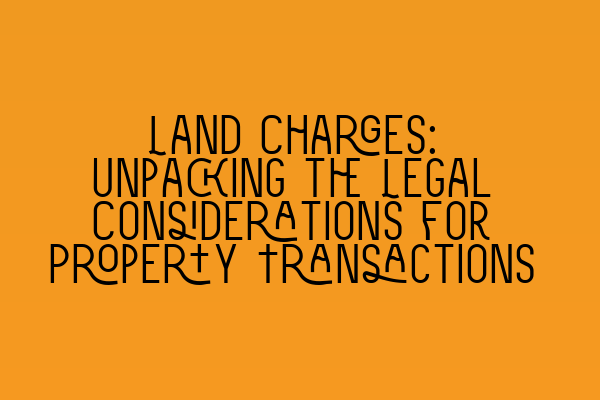Land Charges: Unpacking the Legal Considerations for Property Transactions
When it comes to property transactions, there are many legal considerations that must be taken into account. One such consideration is land charges, which can have a significant impact on the property rights and interests involved. In this article, we will unpack the concept of land charges and explore the legal implications they entail.
What are Land Charges?
Land charges are restrictions or encumbrances that are registered against the title of a property. These charges serve as a way to protect the interests of certain parties over the property, such as creditors or beneficiaries, and provide information to potential buyers or lenders. It is crucial for property law practitioners to have a comprehensive understanding of land charges to ensure smooth property transactions and avoid complications.
Types of Land Charges
There are various types of land charges that can be registered against a property. Some common examples include:
- Mortgage Charges: A mortgage charge is a charge registered against a property to secure a loan or debt. It gives the lender the right to take possession of the property if the borrower fails to repay the loan. Understanding the rights and obligations of both the borrower and lender in a mortgage charge is essential for property transactions.
- Equitable Charges: Equitable charges are charges that arise from equitable rights or interests over a property. These charges may include interests of beneficiaries under a trust, rights of co-owners, or other equitable interests. Properly identifying and addressing equitable charges is crucial to protect the interests of all parties involved.
- Restrictive Covenants: Restrictive covenants are obligations or restrictions imposed on the use of a property. They are registered against the title of the property and bind subsequent owners. Understanding the nature and implications of restrictive covenants is essential for property buyers and sellers to avoid any potential breaches.
Legal Considerations
When dealing with land charges in property transactions, there are several legal considerations to keep in mind:
- Searches and Enquiries: Conducting thorough searches and enquiries is crucial to identify any registered land charges on a property. This information is vital for potential buyers and lenders to make informed decisions. Utilizing online resources and professional services can help ensure a comprehensive search.
- Disclosures: Sellers have an obligation to disclose any known land charges on a property to potential buyers. Failing to disclose relevant information can lead to legal disputes or claims of misrepresentation. Sellers should engage the services of a qualified solicitor to ensure all necessary disclosures are made.
- Priority of Charges: The order of registration can determine the priority of land charges. Understanding the priority of charges is vital for creditors, as it determines their rights and enforcement options. Property law practitioners should carefully analyze the registration dates and advise their clients accordingly.
- Removal or Discharge of Charges: In certain situations, it may be necessary to remove or discharge a land charge from a property. This may involve negotiating with the charge holder, obtaining a court order, or satisfying certain conditions. Understanding the procedures and requirements for removing or discharging land charges is vital to protect the interests of the property owner.
Seek Professional Advice
Given the complexities and potential legal implications surrounding land charges in property transactions, it is highly recommended to seek professional advice from a solicitor specializing in property law. A qualified solicitor will have the expertise and experience to navigate through the intricacies of land charges and ensure a smooth and legally sound transaction.
At SQE Property Law & Land Law, our team of dedicated solicitors specializes in property law and has extensive experience in handling land charges. Whether you are a buyer, seller, or lender, we can provide you with the expert legal advice you need to protect your interests.
For more information about our services, visit our website: SQE Property Law & Land Law.
Related Articles:
